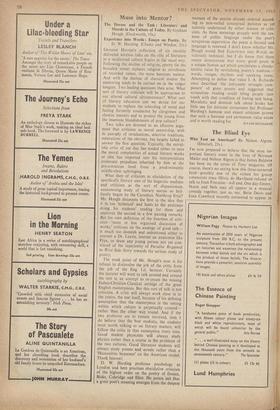Muse into Mentor?
The Dream and the Task : Literature and Morals in the Culture of Today. By Graham Hough. (Duckworth, 15s.) Experience into Words : Essays on Poetry. By D. W. Harding. (Chatto and Windus, 21s.) GRAHAM HOUGH'S collection of six recently delivered wireless talks on the role of literature in a secularised culture begins in the usual way. Following the decline of religion, poetry (in the broadest sense) replaces religion as storehouse of recorded values, the muse becomes mentor. And with the decline of classical studies the mentoring tends to be carried on in the vulgar tongues. Two leading questions then arise. What sort of literary criticism will be appropriate to our altered cultural circumstances? What sort of literary education can we devise for our students to replace the schooling of mind and feeling formerly conducted by clergymen and classics masters and to protect the young from the insensate blandishments of pop culture?
Two talks are devoted to an effective argu- ment that criticism . as moral censorship, with its panoply of revaluations, selective traditions, reiterations of the obvious, has largely failed to answer the first question. Typically, the moral- istic critic of our day has tended either to miss the moral complexities of actual literary works or else has imported into his interpretations irrelevant prejudices inherited by him at the pre-conscious level from a predominantly middle-class upbringing.
What then of criticism as elucidation of the specifically literary uses of the linguistic medium and criticism as the sort of dispassionate, anatomising study of literary norms so bril- liantly begun by the Canadian, Northrop Frye? Mr. Hough discounts the first in the idea that it is too 'technical' and leads to the professor doing his students' reading for them and approves the second in a few passing remarks. But his own definition of the function of criti- cism—`more or less organised discussion of works,' criticism on the analogy of good talk— is much too donnish and unbuttoned either to convert a Dr. Leavis, interest an anatomist like Frye, or draw any young person not yet con- vinced of the superiority of Paradise Regained to West Side Story towards the serious study of poetry.
The weak point of Mr. Hough's case is his refusal to disinvolve the job of the critic from the job of the Eng. Lit. lecturer. Certainly the lecturer will want to talk around and around the text in an attempt to re-create the missing Judaic-Christian-Classical settings of the great English masterpieces. But this sort of talk is not criticism. A critic will always work close in to the centre, the text itself, because of his defining assumption that the masterpiece is the setting within which culture is perpetually created— rather than the other way round. And if the two problems are to remain involved, then I do believe that the best students, the students most worth talking to on literary matters, will follow the critic in that assumption every time. Good student physicists will always study physics rather than a course in the problems of the two cultures. Good literature students will always study poems and novels rather than a `Humanities Sequence' on the American model. Thank heaven I D. W. Harding professes psychology at London and here practises elucidative criticism of the highest order on the poetry of Donne, Blake, Coleridge and Eliot. He points out that a great poet's meaning emerges from the deepest recesses of the psyche already ordered accord- ing to non-verbal conceptual patterns as yet:: scarcely understood by either science or criti- cism. As these meanings grapple with the sys-, terns of public language under the poet's scrupulous supervision the poem is formed and language is renewed: I don't know whether Mr. Hough would find Experience into Words in-. vidiously technical, but I do know that these essays demonstrate that every good poem is a unique human act which precipitates a charac- teristic value by revitalising poetry's medium—i images, rhythms and speaking tones.
Attempting to define that value 1. A. Richards once described 'the intricately wrought com- posure' of great poenis and suggested that scrupulous reading could bring people into touch with that condition of feeling and being. Moralistic and donnish talk about books has little use for intricate composure but Professor Harding's humane and expert criticism proves that such a humane and permanent value exists






























































 Previous page
Previous page